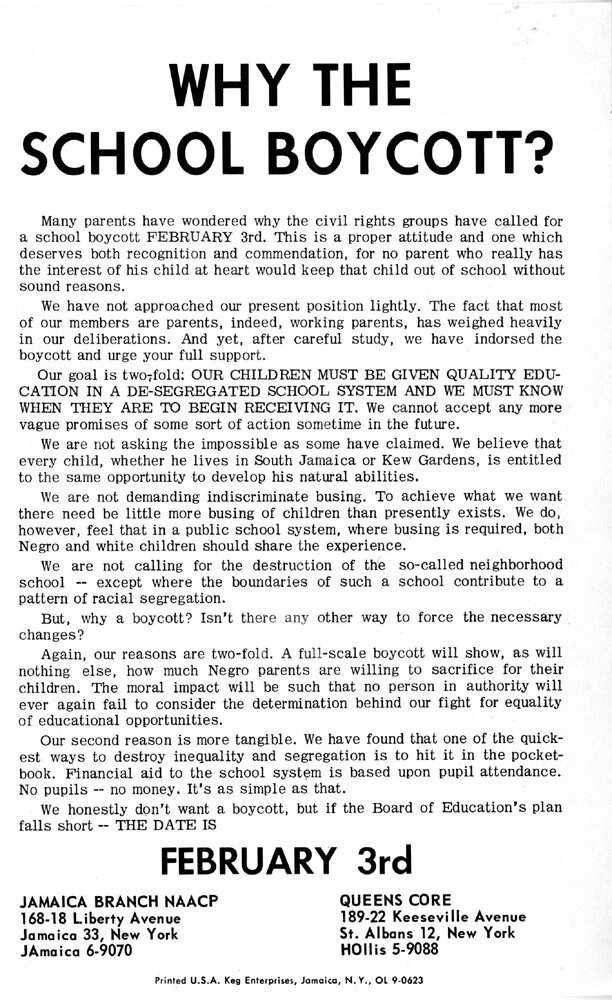Today in Black History: February 3, 1964 New York City Public School Boycott, Nearly a Half Million Children skip Class
On Monday, Feb. 3, 1964, 464,000 New York City school children — almost half of the city’s student body — boycotted school as part of a protest against school segregation. This was one of the largest Civil Rights Movement demonstrations.
Source: Queens College Civil Rights Archives.
An article in the Brooklyn Eagleexplains:
Though segregation in New York was not codified like the Jim Crow laws in the South, a de facto segregation was evident in the city’s school system.
Picketers, made up of teachers, parents, students and activists, marched at 300 of the city’s 860 schools, The New York Times reported. The protest culminated in a march across the Brooklyn Bridge to the Board of Education building on Livingston Street in downtown Brooklyn.
Directing the boycott was long-time civil rights activist Bayard Rustin, who had been a chief organizer of the 1963 March on Washington and had helped organize the first Freedom Ride in 1947. Continue reading.
A flier calling for the boycott (on right) explains:
Many parents have wondered why the civil rights groups have called for a school boycott FEBRUARY 3rd. This is a proper attitude and one which deserves both recognition and commendation, for no parent who really has the interest of his child at heart would keep that child out of school without sound reasons.
Source: Queens College Civil Rights Archives.
We have not approached our present position lightly. The fact that most of our members are parents, indeed, working parents, has weighed heavily in our deliberations. And yet, after careful study, we have indorsed the boycott and urge your full support.
Our goal is two-fold; OUR CHILDREN MUST BE GIVEN QUALITY EDUCATION IN A DE-SEGREGATED SCHOOL SYSTEM AND WE MUST KNOW WHEN THEY ARE TO BEGIN RECEIVING IT. We cannot accept any more vague promises of some sort of action sometime in the future.
We are not asking the impossible as some have claimed. We believe that every child, whether he lives in South Jamaica or Kew Gardens, is entitled to the same opportunity to develop his natural abilities.
We are not demanding indiscriminate busing. To achieve what we want there need be little more busing of children than presently exists. We do, however, feel that in a public school system, where busing is required, both Negro and white children should share the experience.
We are not calling for the destruction of the so-called neighborhood school — except where the boundaries of such a school contribute to a pattern of racial segregation.
But, why a boycott? Isn’t there any other way to force the necessary changes?
Again, our reasons are two-fold. A full-scale boycott will show, as will nothing else, how much Negro parents are willing to sacrifice for their children. The moral impact will be such that no person in authority will ever again fail to consider the determination behind our fight for equality of educational opportunities.
Our second reason is more tangible. We have found that one of the quickest ways to destroy inequality and segregation is to hit it in the pocketbook. Financial aid to the school system is based upon pupil attendance.
No pupils — no money. It’s as simple as that.
We honestly don’t want a boycott, but if the Board of Education’s plan falls short – THE DATE IS FEBRUARY 3rd



